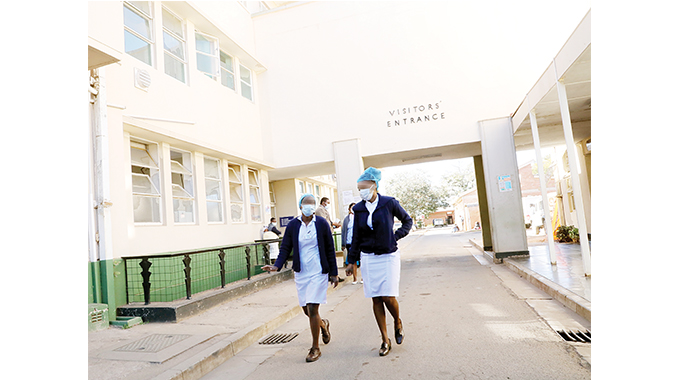High Court okays nurses’ flexible working hours

Mashudu Netsianda, Senior Court Reporter
THE High Court has reversed Government’s decision to scrap the flexible working hours arrangement for nurses, which was introduced during the Covid-19 induced lockdown period after the Zimbabwe Nurses Association (Zina) cited incapacitation.
The flexible working hours originally entailed working long hours of up to 12 for two days a week, an arrangement that was introduced through a collective bargaining agreement (CBA) to cushion health workers, particularly nurses, from high transport costs leading to an indefinite strike over erosion of their salaries by inflation.
However, Cabinet later resolved that all health workers should revert to normal working hours and get compensated for the “flexi-hours” with a tax waiver on all health workers and a risk allowance, but nurses objected.
According to Government, the flexi-hours were removed so as to ensure that there is continuity in service provision.
The ruling by Harare High Court judge Justice Joseph Mafusire follows an urgent chamber application by Zina, through its lawyer Mr Tinotenda Matonhodze of Matizanadzo and Warhurst Legal Practitioners, challenging the Government directive.
Zina, in their court papers, cited Health Services Board (HSB), Health and Child Care Minister, Vice-President Constantino Chiwenga and his Permanent Secretary Air Commodore Dr Jasper Chimedza, as respondents.
Justice Mafusire ruled that pending the finalisation of an application for a declaratory order under case number HC6479/20, the respondents are barred from implementing the directive for nurses to resume the normal shifts.
“If the applicant’s members lose their jobs in the interim, but eventually succeed in the main case, there is little that money will do to restore their previous financial position, especially given the current environment of inadequate income and high inflation,” said the judge.
“Furthermore, the ultimate employer for the applicant’s members is Government. Among other things, no attachment can be levied against Government’s property in execution of the debt, and there is also the argument about increased exposure to Covid-19.”
Justice Mafusire said if the argument finds favour with the court, an award of money may be a remedy too little if disaster strikes.
“The application succeeds. An order is hereby granted that pending the finalisation of an application for a declaratory order under case number HC6479/20, the respondents are barred from implementing the directive by the third respondent (Dr Chimedza) on October 19, 2020, which called upon nurses to resume the normal 40 working hours per week,” ruled the judge.
In his founding affidavit, Zina president, Mr Enock Dongo said the conduct of the HSB was unlawful.
He argued that the directive was regrettable as there was no prior consultation.
“This is an application for an interdict against what the applicant contends is unlawful conduct on the part of first respondent (HSB). In terms of section 26 of the Health Service Act, there is an established body known as the Health Service Bipartite Negotiating Panel (BNP) whose objective is to engage in mutual consultations and negotiate salaries, allowances and conditions of service in the health service,” he said.
“In January 2019, BNP met and discussed a broad range of issues culminating in it releasing the collective bargaining agreement (CBA). In terms of the clause 2 of CBA of 2019, BNP agreed on the introduction of flexible hours, which would be in place until there was a review of renumerations in April 2019.”
He said on August 28, 2019, the negotiating panel met again and agreed that the workers’ position was that they remained incapacitated despite the introduction of the cost of living adjustment and as such will continue with flexible working hours.
“It is therefore clear that pursuant to CBA 2 of 2019, the agreement was that flexible hours would remain in place until health workers were no longer incapacitated. It is the applicant’s contention that following a lawful process under the auspices of BNP, Zina membership has been benefiting from a measure mutually agreed on, allowing nurses to work flexible hours,” said Mr Dongo.
He said the flexible working hours arrangement was done to mitigate the ravages of Covid-19 pandemic on nurses as it reduced their exposure while on duty.
The nurses argued that they stood to suffer irreparable harm if the permanent secretary of Health and Child Care’s directive is implemented.
In her opposing affidavit, HSB chief executive director, Ms Ruth Kaseke said the dispensation of flexible hours for nurses ended at the time of the review of renumeration in August last year.
She said there was no agreement between the parties to extend it and as such Zina had no right or prima facie to prove their case.
“The arrangement terminated on the occurrence of the review of renumeration regardless of whether Zina felt the review was adequate or not,” argued Ms Kaseke.
She disputed Zina’s assertion that HSB conduct was unlawful in implementing the directive.
Ms Kaseke also denied that HSB agreed that the arrangement of flexible hours would remain in place until the health workers were no longer incapacitated.
She said nurses failed to report for work because of their refusal to abandon the programme of flexible working hours.
“They are now being disciplined for that, and it is being done lawfully in terms of the provisions of the Labour Act,” said Ms Kaseke. — @mashnets












Comments